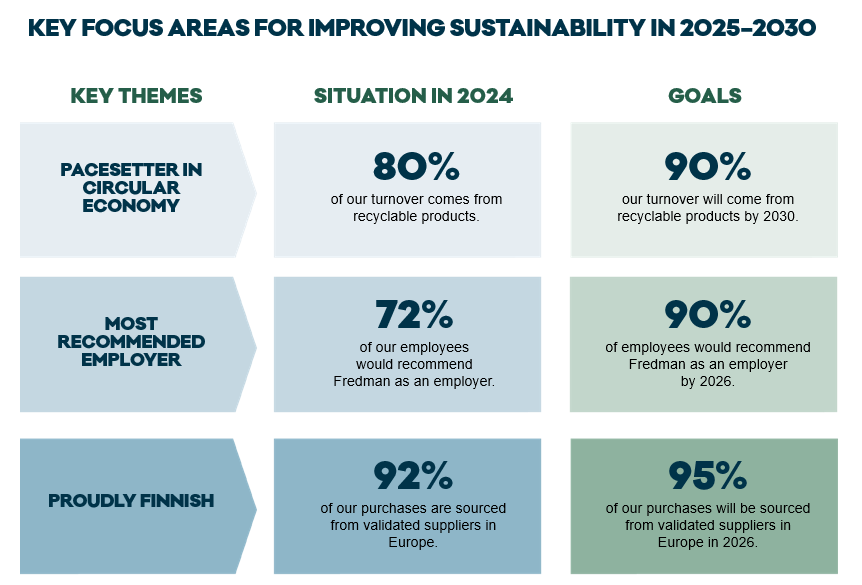Food production has a huge impact on nature and the environment. It causes about 30% of the world’s climate emissions, and at the same time, up to a third of all produced food is wasted. Food production also uses about half of the Earth’s land area, thus taking space from wild nature.(Source: Our World in Data)
Since food production uses a lot of valuable resources, we want to ensure that it ends up as nourishment. At Fredman, we are an important part of the food chain’s sustainability in cooking, storage, transportation, and serving.
Our Sustainability Program 2025-2030
Our Corporate Responsibility Program 2025–2030 guides our work towards more sustainable operations for nature, people, and society. We updated the program in the spring of 2024, and it is based on a double materiality analysis of the most relevant sustainability aspects for Fredman. In our analysis, we examined the impacts of Fredman on people, nature, and society, as well as the risks and opportunities that sustainability issues bring to Fredman’s business.
The analysis identified resource efficiency and circular economy, climate change, our workforce, consumers and end-users, and ethical business practices as the most important aspects. The analysis was conducted in accordance with the European Union’s sustainability reporting directive. In identifying sustainability themes, we utilized the European Sustainability Reporting Standards (ESRS).
Our sustainability work focuses on three essential themes:
Driving the circular economy – We minimise the use of non-renewable resources
Most recommended employer – We want to be the best employer in the industry
Proudly Finnish company – We invest in our own production and favour materials of European origin in procurement.

Take a closer look at our Sustainability Program 2025-2030
Take a look at our Sustainability Report 2024
In our annual Sustainability Reports since 2021, we present our actions to promote responsibility related to the climate, our personnel and other important topics.
Fredman’s Climate Goals Align with the Paris Agreement
The Science Based Targets initiative (SBTi) has approved Fredman Group Oy’s short-term emission reduction targets. Fredman commits to:
- Reducing absolute Scope 1 and 2 carbon dioxide emissions in Fredman companies by 42% from the 2022 baseline by 2030.
- Measuring and reducing other indirect emissions (Scope 3) in our value chain.
We are committed to supporting four of the United Nations Sustainable Development Goals (SDGs) that are particularly relevant to our operations and stakeholders. These goals are aligned with the main themes of our sustainability efforts.
SDG 8 – Decent and economic growth
SDG 12 – Responsible consumption and production
SDG 13 – Climate action
SDG 15 – Life on land